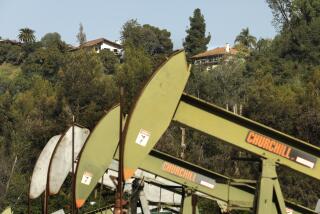Democrats’ effort to increase oil spill liability stalls
- Share via
Reporting from Washington and Los Angeles — In an opening skirmish over how much money companies should be forced to pay for oil spill damage, Democratic legislators Thursday failed to speed through legislation to raise liability caps from $75 million to $10 billion.
Their effort was thwarted by Sen. Lisa Murkowski (R-Alaska), a key oil industry ally who said that the bill would end up empowering only the “biggest of the big oil” companies to drill for American’s offshore resources.
“This has been named ‘The Big Oil Bailout Prevention Liability Act,’ ” said Murkowski, who objected to taking up the measure immediately.
The American Petroleum Institute, the industry’s trade group, said Thursday that raising the cap could also increase the costs of exploration and production in the Gulf of Mexico by 25%, “which would threaten our nation’s energy security, reduce government revenues and cost thousands of American jobs.”
Sen. Bill Nelson (D-Fla.), a sponsor of the bill, expressed disappointment that “some of my colleagues decided to block legislation to hold BP accountable for this disaster” that resulted in the massive oil spill in the gulf. “We still don’t know how bad it will be.…I’m not even sure $10 billion would be enough.”
He pointed to BP’s recent quarterly profits, which rose to $6.1 billion from $2.6 billion a year earlier.
A spokesman for the London-based company said it has not taken a position on the liability cap.
Damage from the spill, which has begun to lap at portions of Louisiana’s coast, could reach into the billions of dollars depending on its impact on gulf states’ fishing and tourism economies.
Despite Thursday’s legislative maneuvering, some increase in the liability cap is expected to be included in legislation that moves through Congress, perhaps within weeks.
The push to raise the liability cap came as BP considered various methods to stem the uncontrolled well, which the Coast Guard and BP estimate is gushing at least 210,000 gallons of oil a day into the waters about 50 miles off Louisiana.
The company said it plans to thread a small tube into the damaged pipe to suck oil to the surface before it can escape from the damaged well. The operation was expected to begin Thursday night but would probably take 12 hours to be completed, a BP spokesman said.
BP is also considering two other methods to cap the well: a “top hat” device to place over the well to contain the oil before piping it to the surface, and a “junk shot” to stop up the leak with golf balls and other debris. Meanwhile, it has begun drilling a relief well, which would not be operative for at least two months.
As BP struggled with logistics, the Swiss company that owned and operated the ill-fated Deepwater Horizon rig and leased it to BP sought to limit its liability in the accident. Transocean Ltd., the world’s largest offshore oil contract driller and owner, and several of its affiliated companies filed a federal court petition in Houston to establish a single fund from which claims could be paid.
Nearly 100 lawsuits have been filed over the incident so far. According to Martin Davies, a maritime law expert at Tulane University, if Transocean’s suit is successful, its liability could be limited to the current value of the rig — about $26.8 million.
The figure is based on the company’s claim that the rig, which had been worth $500 million, now has zero value as a charred hulk at the bottom of the gulf, but had accrued nearly $26.8 million in unpaid drilling rental fees.
The debate over liability in Congress may not necessarily divide along party lines. Four Republican senators from Gulf Coast states — David Vitter of Louisiana, Jeff Sessions of Alabama, Robert Wicker of Mississippi and George LeMieux of Florida — introduced a bill Thursday that could push liability even higher than $10 billion in some cases.
The legislation would raise the cap to “the last four quarters of a responsible party’s profits or double the current limit, whichever is greater.” In BP’s case, that would mean the company’s liability could reach $20 billion. But smaller, less profitable companies could be on the hook for far less than $10 billion in the event of a spill.
Murkowski and fellow Alaska Sen. Mark Begich, a Democrat, have proposed increasing the size of a federal spill response fund by raising the tax per barrel of oil by a penny, from 8 to 9 cents. Murkowski also said the Senate should consider raising the liability cap for individual accidents, “but we need to be careful about unintended consequences.”
Times staff writers Ronald D. White and Richard Faussett also contributed to this report.
More to Read
Sign up for Essential California
The most important California stories and recommendations in your inbox every morning.
You may occasionally receive promotional content from the Los Angeles Times.












